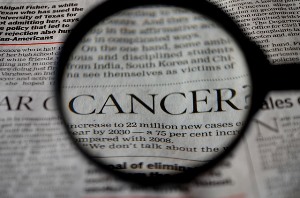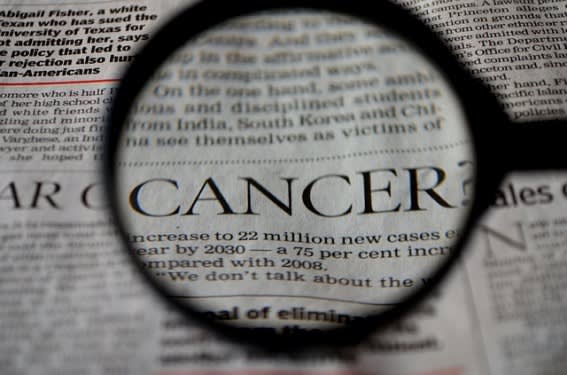Alan Freishtat will be in the NY-NJ area from January 13-16 and the Baltimore-Washington area from January 17-19. He will be available for consultations and group seminars during that time. For further information call 1-516-568-5027 or email alan@alanfitness.com.
When it comes to cancer, most people who I have met and spoken with think that the only preventable measure is not smoking—but, many cancers are preventable and the right lifestyle interventions are key for cancer prevention.
What exactly is cancer?
 All cancers can be characterized by the uncontrolled growth and spread of abnormal cells. If the spread is not controlled, it can, God forbid, be fatal, as vital passageways are blocked and the body’s oxygen and nutrient supplies are diverted to support the rapidly-spreading cancer. Normally, our body cells reproduce and divide in an orderly manner. In that way, old cells are replaced and injured cells are repaired. However, some cells undergo abnormal changes because of oxidants, radiation, viruses, hormones, immune conditions and inherited mutations. It is these abnormal cells that grow into masses called tumors. These tumors can be benign or cancerous.
All cancers can be characterized by the uncontrolled growth and spread of abnormal cells. If the spread is not controlled, it can, God forbid, be fatal, as vital passageways are blocked and the body’s oxygen and nutrient supplies are diverted to support the rapidly-spreading cancer. Normally, our body cells reproduce and divide in an orderly manner. In that way, old cells are replaced and injured cells are repaired. However, some cells undergo abnormal changes because of oxidants, radiation, viruses, hormones, immune conditions and inherited mutations. It is these abnormal cells that grow into masses called tumors. These tumors can be benign or cancerous.
Research has shown that the lifetime risk for developing cancer is 45 percent in men and 39 percent in women. However, according to the American Cancer Society, up to two-thirds of cancers are preventable. There is also good news on the cancer treatment front. In the 1930s, fewer than one in five people were alive after five years of treatment for cancer, but today, more than 50 percent of people getting treatment live five years or more afterwards, and these numbers are expected to continue to improve.
In 2006, a landmark study in cancer prevention was released by the World Cancer Research Fund, which told us that indeed there is convincing evidence linking body fat and six types of cancer. This report was compiled after studying 7,000 studies since records were kept in the 1960s. All of the 21 scientists involved are individuals at the top of their fields. There were five key findings in the report including:
- Processed meats increase colorectal cancer.
- There is a link between red meat and colorectal cancer.
- Alcohol is a cause of cancer.
- Mothers should breastfeed exclusively for the first six months infants in order to prevent breast cancer.
- Dietary supplementation will not prevent cancer.
- Keep your weight down to a BMI of 23 or less.
“Watching our weight, working regular physical activity into our daily lives and eating a healthy balance of food could prevent a third of cancers,” emphasized Karen Collins, a nutrition advisor at the AICR (American Institute on Cancer Research). Dr. Walter Willet of Harvard Medical School and one of the researchers involved in the study is quoted as saying “We need to think about cancer as the product of long-term influences, not as something that just happens.”
The report has nine definitive recommendations for reducing your risks of getting cancer along with two special recommendations:
- Be as lean as possible within the normal range of body weight.
- Be physically active as part of everyday life.
- Limit consumption of energy dense foods and avoid sugary drinks.
- Eat mostly plant-based foods.
- Limit intake of red meat and avoid processed meat.
- Limit alcoholic drinks.
- Limit the consumption of salt and moldy grains and legumes.
- Aim to meet nutritional needs through diet alone without dietary supplements.
- Avoid sugary drinks (added after the original report).
- Special recommendation #1: Mothers should breastfeed, children should be breastfed
- Special recommendation #2: Cancer survivors should follow the recommendations for cancer prevention.
This report gives the most definitive advice yet on cancer preventions. Although the complete report is 530 pages, there is also a shorter summary available through the American Institute of Cancer Research. It pays to take the time to read the summary and to internalize its findings. The advice given will not only increase your odds of not getting cancer, but the advice is helpful for heart disease prevention as well.
The diet and exercise component of this report is significant. Physical activity and exercise in and of itself cuts cancer risk. Aim for 30 minutes exercise plus activity each day and as your fitness improves, increase to 60 minutes.
Limit your sedentary activities.
It is interesting to note is that it took the American Heart Association a long time to identify inactivity as a risk factor for heart disease. However, as far back as 1996, the American Cancer Society added regular physical activity to their list of preventive measures.
More current research is showing beyond a doubt that:
- Physical activity may lower the risk of cancer by preventing obesity, reducing inflammation and hormone levels, and improving insulin resistance and immune system function.
- Physical activity is associated with a lower risk of several types of cancers, including breast cancer and colon cancer.
As we try to implement all of the lifestyle changes mentioned earlier, we lessen our chances of letting carcinogens act on our cells in a way that will cause cancers.
What are carcinogens?
Any substance or agent directly involved in causing cancer. How many are there? Tens of thousands! We really can’t avoid them all. They are in the environment, in foods, in household cleaning products and just about everywhere else. Although we can’t avoid all of them, it is important to keep our exposure to them as little as possible.
Even though we are speaking here of prevention and not curing cancer, cancer experts do encourage moderate exercise during treatment. In addition to the various therapies used to treat cancer, making dietary adjustments, doing exercise and learning relaxations techniques, will also help in curing your cancer.
No, we can’t prevent all cancer but there is a lot we can do to greatly reduce our chances of getting what can be a very difficult disease to cure. By following the nine recommendations, you will “add hours to your day, days to your year, and years to your life.”
Alan Freishtat is an A.C.E. CERTIFIED PERSONAL TRAINER and a BEHAVIORAL CHANGE and WELLNESS COACH with over 19 years of professional experience. Alan is the creator and director of the “10 Weeks to Health” program for weight loss. He is available for private coaching sessions, consultations, assessments and personalized workout programs both in his office and by telephone and skype. Alan also lectures and gives seminars and workshops. He can be reached at 02-651-8502 or 050-555-7175, or by email at alan@alanfitness.com Check out the his web site –www.alanfitness.com US Line: 516-568-5027.
The words of this author reflect his/her own opinions and do not necessarily represent the official position of the Orthodox Union.

